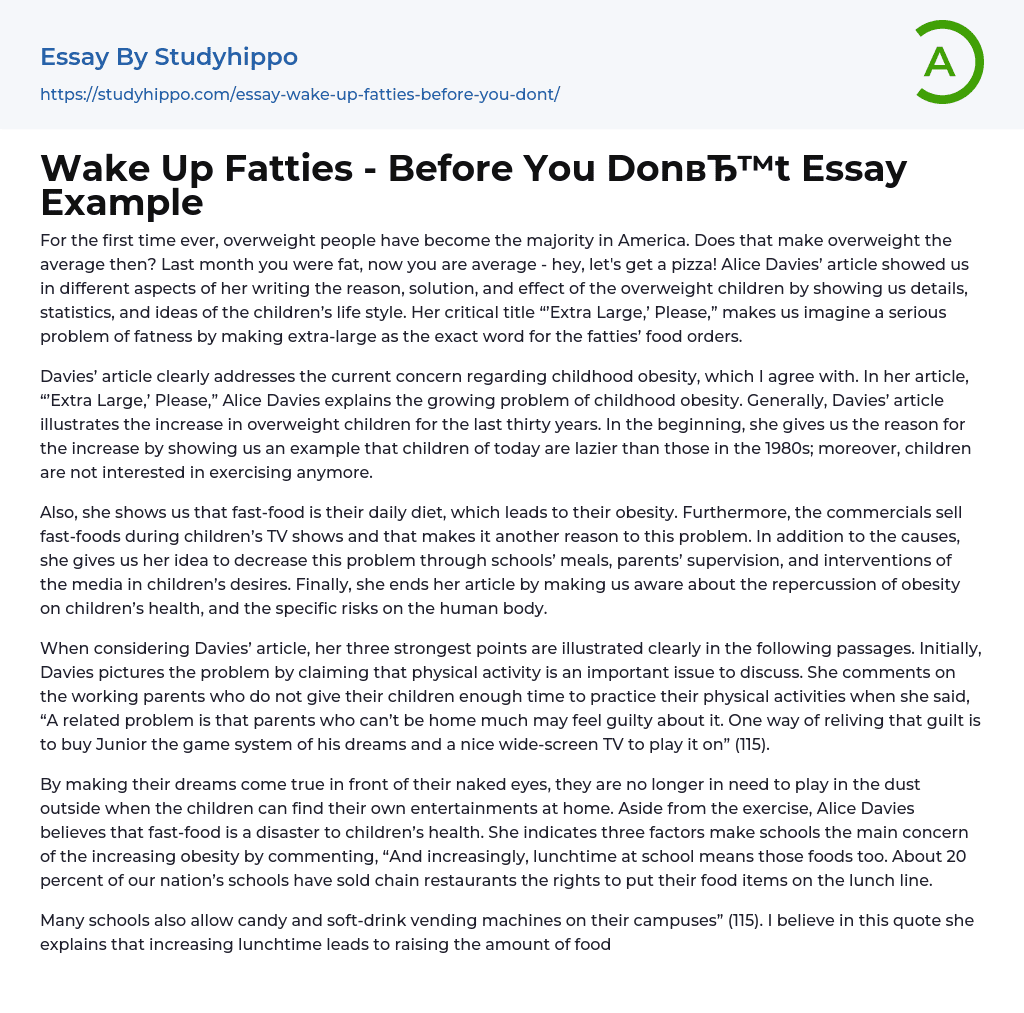Alice Davies discusses the growing problem of childhood obesity in America, examining its causes, potential solutions, and resulting impacts. She presents extensive data and insights regarding children's lifestyles. The article's title, "'Extra Large,' Please," underscores the severity of the issue by highlighting the significant food orders made by obese individuals.
In her article "Extra Large,' Please," Alice Davies effectively discusses the issue of childhood obesity. I agree with her concerns as she notes a significant increase in overweight children over the past three decades. She attributes this rise to the decline in physical activity among today's children compared to those in the 1980s. Additionally, she emphasizes that children nowadays are less motivated to exercise than they were before.
Also, she demonstrates that fast-food is a regular part of the
...ir diet, resulting in obesity. Moreover, the advertisements promote fast-foods during children's television programs, which exacerbates the issue. In addition to the causes, she proposes schools providing healthier meals, parents monitoring their children's diets, and media intervention in shaping children's desires as potential solutions to this problem. Ultimately, she concludes her article by emphasizing the health consequences of obesity in children and the specific risks it poses to their bodies.
Davies’ article highlights three main points that are emphasized in the following passages. In the first passage, Davies addresses the importance of physical activity and discusses the problem of working parents who struggle to allocate enough time for their children to engage in physical activities. She states, "A related problem is that parents who can’t be home much may feel guilty about it. One way of relieving that guilt is t
buy Junior the game system of his dreams and a nice wide-screen TV to play it on" (115).
According to Alice Davies, children no longer have the desire to play outdoors in dusty spaces as they can find amusement at home and make their aspirations a reality. Davies highlights the detrimental effects of fast-food on children's health and attributes the increasing rates of obesity to schools. She reveals that school lunchtime now presents unhealthy food options, with approximately 20% of schools permitting chain restaurants to sell their meals on campus.
The author suggests that numerous schools allow candy and soft-drink vending machines on their campuses (115). In my view, this quote implies that expanding lunchtime leads to more food being served, ultimately raising fat levels in children. Additionally, the author explores the impact of commercials, highlighting their association with popular toys, beloved cartoon characters, or movies aimed at children. These commercials make kids feel hungry or give them a sense of hunger (116).
According to the author, commercials have the ability to deceive children and create a feeling of hunger in them, which ultimately increases their appetite and contributes to their obesity. The author agrees with Davies' belief that childhood obesity primarily stems from a lack of exercise, consumption of fast-food, and inadequate regulation on commercials. To illustrate this point, the author shares the story of their cousin, Maryam. Maryam's parents prioritized providing her with material possessions such as video games, dolls, and an iPad while they were busy with work. Sadly, this resulted in Maryam falling victim to obesity.
Their primary concern was ensuring their daughter
had a pleasant experience at home due to the lack of supervision during her outdoor playtime. Maryam possesses an extensive collection of toys that any child would find enjoyable, which motivates her to remain indoors. Alice Davies highlights the critical issue of inadequate parental oversight, mirroring Maryam's own experiences. Consequently, while Maryam is currently flourishing within her household setting, she continues to feel dissatisfied with her physical stature.
Alice Davies’ article brings attention to the seriousness of the problem of overweight children in our society. To address this issue, it is important to eliminate fast-food options from schools, increase supervision for children, and prioritize time for physical activity. It is crucial that overweight individuals understand the urgency of their situation. Personally, coming from a conservative family that emphasized balanced meals and regular exercise, I strongly identify with this article. It makes me contemplate the magnitude of this problem and the necessary steps we must take.
- Childhood Memory essays
- Pregnancy essays
- Death essays
- Asthma essays
- Chronic Pain essays
- Diabetes essays
- Infection essays
- Infertility essays
- Pain essays
- Sexually Transmitted Disease essays
- Cholesterol essays
- Epidemic essays
- Pathogen essays
- Symptom essays
- Water supply essays
- Myocardial Infarction essays
- Chronic essays
- Hypertension essays
- Black Death essays
- Breast Cancer essays
- Down Syndrome essays
- Apoptosis essays
- Tuskegee Syphilis Experiment essays
- Type 2 Diabetes essays
- Food essays
- Genetically Modified Organisms essays
- Child Development essays
- Eating essays
- Breakfast essays
- Genetically Modified Food essays
- Milk essays
- Chewing gum essays
- Energy Drink essays
- Caffeine essays
- Chocolate essays
- vegetarian essays
- Weight Loss essays
- Anorexia essays
- Metabolism essays
- Diet essays
- Vitamin essays
- Dieting essays
- Junk Food essays
- Eating Habits essays
- Food Safety essays
- Food Security essays
- Beverages essays
- Cuisines essays
- Dairy essays
- Desserts essays




